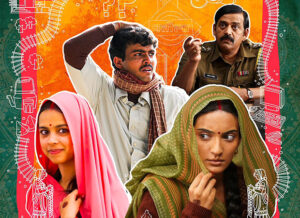Laapataa Ladies: A Heartwarming Satire That Uplifts and Entertains

Kiran Rao’s “Laapataa Ladies” (released internationally as “Lost Ladies”) is a delightful blend of humor, heart, and sharp social commentary that marks a triumphant return for the director after a 14-year hiatus. Set in the fictional Nirmal Pradesh in 2001, this comedy-drama, produced by Aamir Khan Productions, weaves a deceptively simple tale of two young brides, Phool Kumari (Nitanshi Goel) and Jaya Tripathi (Pratibha Ranta), who are accidentally swapped during a train journey to their husbands’ homes. What unfolds is a charming narrative that balances laugh-out-loud moments with a poignant critique of gender norms and patriarchal structures in rural India.
The premise is ripe for comedy: Deepak Kumar (Sparsh Shrivastava), a naive and lovelorn groom, mistakenly takes Jaya home instead of his bride, Phool, due to their identical red veils—a nod to traditional bridal customs. As Deepak scrambles to locate Phool with the help of a cheerfully corrupt police officer, Shyam Manohar (Ravi Kishan), Phool finds herself stranded at a railway station, where she befriends the tough yet kind-hearted tea stall owner, Manju Mai (Chhaya Kadam). Meanwhile, Jaya, who harbors dreams of studying organic farming, seizes the mix-up as an opportunity to escape an abusive marriage. The ensuing misadventures are both hilarious and deeply moving, as the two women embark on journeys of self-discovery.
Rao’s direction shines in its ability to keep the tone light while delivering a powerful feminist message. The screenplay by Sneha Desai, based on a story by Biplab Goswami, avoids heavy-handed preaching, instead using wit and irony to expose the invisibilisation of women in society. Scenes like Deepak presenting a wedding photo where Phool’s face is obscured by her veil cleverly highlight how women are often reduced to mere symbols. The dialogue, peppered with sharp one-liners, captures the rustic charm of the Hindi heartland while landing emotional punches, such as Manju Mai’s biting remark: “If all women figured this out, men would be screwed, wouldn’t they?”
The cast, largely composed of newcomers, delivers stellar performances. Nitanshi Goel is a revelation as Phool, embodying innocence and resilience with heartbreaking authenticity. Pratibha Ranta imbues Jaya with quiet strength, making her a compelling voice for women’s agency. Sparsh Shrivastava brings depth to Deepak, transforming a seemingly passive character into a relatable everyman navigating societal expectations. Ravi Kishan steals scenes as the morally ambiguous Shyam Manohar, whose arc delivers one of the film’s most satisfying surprises. Chhaya Kadam’s Manju Mai is the soul of the story, offering both comic relief and profound wisdom.
The film’s technical aspects are equally impressive. Vikash Nowlakha’s cinematography captures the vibrancy of rural India, while Ram Sampath’s bouncy score keeps the energy high. Though the pacing occasionally lags in the first half and some plot points feel slightly contrived, the final 30 minutes deliver a gratifying climax that leaves audiences smiling and reflecting.
“Laapataa Ladies” is a rare gem—a low-budget film (reportedly made for ₹5 crore) that proves powerful storytelling doesn’t need big stars or lavish sets. Its selection as India’s entry for the Best International Feature Film at the 97th Academy Awards, though controversial, underscores its universal appeal. The film’s blend of humor, heart, and social critique makes it a must-watch for families and anyone seeking meaningful cinema. As one review aptly noted, it’s “a giant warm hug” that entertains while gently lifting the veil on patriarchy.
Rating: ★★★★☆ (4/5)
